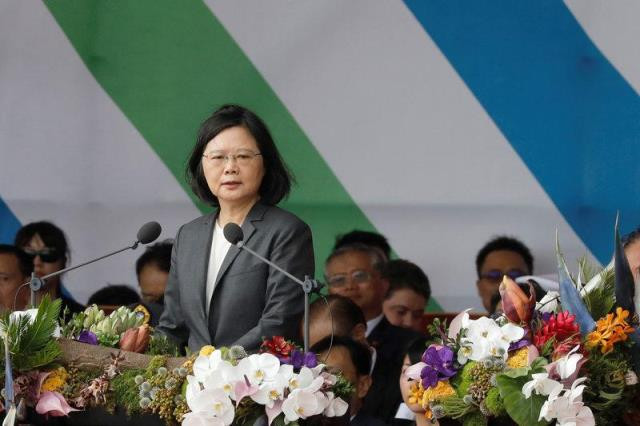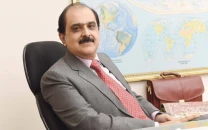Taiwan president pledges to defend freedoms despite China pressure
China has cut off a regular dialogue mechanism, ramped up military drills and stepped up international pressure

Taiwan President Tsai Ing-wen gives a speech during the National Day celebrations in Taipei, Taiwan, October 10, 2017. PHOTO: REUTERS
China considers proudly democratic Taiwan to be a wayward province and has never renounced the use of force to bring the island under its control.
Relations with Beijing have deteriorated sharply since Tsai, who leads the pro-independence Democratic Progressive Party, took office last year, with China suspecting she wants to push for the island’s formal independence, a red line for Beijing.
China has cut off a regular dialogue mechanism with Taiwan, ramped up military drills around the island and stepped up international pressure to limit Taiwan’s diplomatic footprint.
Taiwan suspends oil exports to North Korea, imports of clothing
Tsai, who has pledged to maintain peace with China, said her government was still seeking breakthroughs in ties with Beijing and promised consistent and stable policies.
“We need to remember democracy and freedom were rights obtained through all of Taiwan people’s countless efforts,” Tsai said.
“Therefore, we need to use all our power to defend Taiwan’s democratic and freedom values and lifestyle,” she said.
Tsai’s speech came a week before China holds its twice-a-decade Communist Party Congress, where President Xi Jinping, who has taken a robust approach to territorial disputes in the East and South China Seas, will cement his grip on power.
Her government has continued to rattle Beijing, with her newly appointed premier, William Lai, telling parliament last month he was a “political worker who advocates Taiwan independence”.
However, Tsai has also sought to give Beijing a roadmap where its “goodwill” can be extended, which in turn could give her a chance to reciprocate and rein in the more independence-leaning hardliners on the island.
China facing intensified threat of religious infiltration, extremism: official
“We have offered our greatest goodwill,” she said in her 20-minute address.
“I have repeatedly said, our goodwill doesn’t change, our promises don’t change; we won’t walk on the old path of confrontation, but we won’t bow to pressure,” Tsai said.
Tsai reiterated the importance of implementing the island’s new “southbound” policy of forging closer ties with countries in the region, saying Taiwan was seeking to find a new position in the international community.
Taiwan has stepped up efforts to reduce its reliance on China and broaden engagement with 18 countries across the region under the policy, seeking to deepen economic and political ties.
“In the face of rapid change in the Asia-Pacific region, Taiwan is already prepared to play an even more important role in the region’s prosperity and stability,” she said.



















COMMENTS
Comments are moderated and generally will be posted if they are on-topic and not abusive.
For more information, please see our Comments FAQ